- Home
- Michael Chabon
Kingdom of Olives and Ash: Writers Confront the Occupation Page 4
Kingdom of Olives and Ash: Writers Confront the Occupation Read online
Page 4
With the ratification of the Oslo accords in 1993, the swiss cheese course further intensified: bypass roads, “legal and agreed upon,” were established to legitimize the settlements permanently, transforming these distant, remote places in frightful locations (holes) into suburbs convenient to Jerusalem and Tel Aviv from which one might come and go using roads restricted to Jews, modern streets (as in Europe or America), unlike the Palestinians’ streets (as in the Middle East), which increased the popularity of living there (in the body of the cheese). For that, you must guarantee freedom of movement for the new Jewish residents in the luxurious suburbs, and limit this freedom for the other side, so that the new residents of the suburbs feel safe and secure. How? By a number of basic means, including limiting the exits and entrances to and from the Palestinians’ towns and villages to only two for each town; and directing the Palestinian traffic toward the “must-use roads.” In this way the mouse can be kept inside the holes. He can go out only on orders and can come back only on orders. This was a win-win: control over these bothersome, overly possessive Palestinians, and a comfortable and economically beneficial suburban life for the new owners of the place.
The shepherd Abu Ali strolls alongside the lands of the Palestinian village of Susiya in the Hebron Hills and tries to maintain the status quo: it is forbidden to graze in the hills in that direction, because that is a closed military zone, and it is forbidden to graze in the hills opposite, because they belong to the settlers, so he must be careful that none of the dozens of sheep he is tending violate these restrictions. We stand with him in the bitter cold, talking and smoking. I am surprised by how he is able to stand there with us without gloves or a heavy coat. A stubborn, cold, painful question occupies me: What have they done to us, Palestinian shepherd? Why are you this foreign to me; do you know how we can break the ice (literal and figurative) between us? What does Abu Ali want from life? To be allowed to graze his sheep on the forbidden hill opposite, where there is ample pasturage. How is it possible for this wish to be so hard? It is nothing but a wish to save time: if he grazes his sheep on the hill, the sheep will satisfy their appetites quickly, and he will go back to his cave or hut quickly to sit next to the warm stove with his wife and children. All he wants is to shorten this bitter, cold time.
But this wish runs into “official” complications: the settlers have planted trees in tubs in order to assert that they are growing. The Ottoman law that is still in force here states that whoever cultivates the land for several years obtains the right to possess it; the law does not clarify the meaning, size, or extent of “cultivation.” To work around the law, the settlers plant the trees in tubs and spread them over vast areas in order for the land to become “theirs.” One and a half percent of the land in the West Bank is cultivated by settlers, some of it in this way. It is an invented method of cultivating the land that does not concern itself with time, or time passing: you don’t need decades of tilling the earth, tending it, watering it, sleeping under its trees, learning its language and listening to its stories, for it to become yours. These Palestinians are traditional in their farming, and slow; whereas high-tech farming in tubs is very fast. Another Israeli “exit.”
In Susiya, they are searching for water and wells. They dig wells and the army floods them. There is no life without water, and there is no water without a permit, and there is no permit unless you are part of the controlling settler body. It does not count that you were here before the occupation and even before the establishment of Israel; what counts is that you have become outside the context. And the context is that the hole has become the body. You have become a bothersome hole. Susiya is not bothersome for this reason alone, but also because it was originally built on a highly “significant” archaeological site. And so they expelled its residents, and in a grand paradox, brought in Jewish settlers to replace them. For this is a known fact: Jews are better than Palestinians at living in ruins. The whole country was established to rebuild ruins, so who are these shepherds from Susiya to demand back a place that is reserved for Jews only?
The wall robs you of time and your right to kill it as you like. Walking through the fields or strolling on the dirt roads is no longer a given. The walls tear your existence into little unconnected bits of approved areas and forbidden areas, so you become an acrobat who must leap, skip, bend, and crawl according to the type of permit, the wish of the area commander, or the considerations of the sullen soldier at the checkpoint. The wall is a memorial to the past; it was raised upright between everything you have experienced before and everything you will experience after. Distant kilometers of barbed wire and tall cement slabs stand between you and your ability to extend your gaze and imagination toward the sea, for example, or toward a nearby brook, or the fast road that carries people from the sea to the brook that was once yours.
Nabi Saleh: the stubborn, peaceful demonstration against the settlements in general, and against the nearby settlement of Halamish’s takeover of Nabi Saleh’s spring in particular. Tear gas and metal bullets covered with rubber. Amid the ferocity of the confrontations and the suffocation in the houses, a mother drops her little daughter from a second-story window to her husband in the street to save her from suffocating. It is both a courageous and a rational deed. Feelings mixed, between admiration for the willingness of this mother to do anything to save her child, and astonishment at her willingness to drop her from the window. But this child does not yet know the meaning of paradox: afterwards she refused to go near her mother for two whole months! If you ask me for a one-sentence definition of the meaning of the occupation, I will tell you with great confidence: a mother dropping her daughter from a window to save her life.
But time is liable to ease any paradox and dispel any admiration. The occupation resembles the Thousand and One Nights. Every day brings a new story, a new adventure that makes you forget what came before and prepare for what comes after. The complex bureaucratic machine is the Scheherazade of our era. From among its shirtfronts policies emerge, and by way of its tent flaps stories are generated: in the line of cars at the checkpoint; in the ambulance that carries a patient who will die of waiting (I almost wrote of boredom, but that metaphor would be excessive here); in a demonstration overrun with conquering military jeeps; in the liaison office that refuses, in bulk, entry permits to Israel for medical care, except for those willing to collaborate with the machine; in the drinking water that “takes its time” in coming and going; in the waste of two hours of your life at the impromptu checkpoint, which you later find out was arbitrary and no longer meant anything to anyone. What a humiliation, to be held up at an arbitrary checkpoint!
We arrive at Khirbet Umm al-Khair in the Hebron Hills and see what remains of the temporary residential buildings after their demolition by the Israeli Civil Administration’s bulldozers a few days before. The elderly father of the family is shouting nonstop. I am an Arab, son of this land. I can scarcely understand his screaming. He jumps from one delegation member to another, shouting out his pain and his story. He longs to tell his tale. They came . . . they demolished . . . they came . . . they demolished . . . look at the children . . . look at the settlers’ houses around us. But he does not weep or break down. He shouts with rage, with ferocity. He wants the world to see and hear. I take him aside and start filming a video of him so that we can allow the rest of the delegation to walk around and get the clear details from the other family members who speak English or Hebrew. I hold the camera in front of him for more than twenty minutes as he recites his rapid monologue, frenziedly, without pausing for a moment. My arm is getting tired, my eye is getting tired of looking through the lens, then I realize I am a little bored. This discovery kills me. Is it possible for one to feel boredom from hearing the story of a man in his seventies whose home was demolished just days ago, for the . . . no one knows, how many times? Then I am struck by this sad, futile situation: one Palestinian shouting into the camera of another Palestinian what we must shout to the whole world. Once
again, we leap into a small site and speak among ourselves. Our language is not understood, our body language is not loved, our shouting is uncivilized. And suddenly my eyes fill with tears and I feel sorrow, shame, and bitterness. Despite my endless promises to the family members to post their father’s oration on my Facebook page, I have not done it. It would provoke laughter, no question. No one would understand half his words or his sentences, and no neutral or distant viewer could endure his tense body movements and his fierce jumping up and down. Forgive me, old man, I don’t know which is harder on you: people seeing you and laughing at you, or me hiding you from them, not giving even a single one of them the opportunity to understand you.
The occupation bloats time.
The occupation is the death of meaning.
(Translated from the Arabic by Peter Theroux)
Giant in a Cage
Michael Chabon
1.
The tallest man in Ramallah offered to give us a tour of his cage. We would not even have to leave our table at Rukab’s Ice Cream, on Rukab Street; all he needed to do was reach into his pocket. At nearly two meters—six feet four—Sam Bahour might well have been the tallest man in the whole West Bank, but his cage was constructed so ingeniously that it could fit into a leather billfold.
“Now, what do I mean, ‘my cage’?” He spoke with emphatic patience, like a remedial math instructor, a man well practiced in keeping his cool. With his large, dignified head, hairless on top and heavy at the jawline, with his deep-set dark eyes and the note of restraint that often crept into his voice, Sam had something that reminded me of Edgar Kennedy in the old Hal Roach comedies, the master of the slow burn. “Sam,” he said, pretending to be us, his visitors, we innocents abroad, “what is this cage you’re talking about? We saw the checkpoints. We saw the separation barrier. Is that what you mean by cage?”
Some of us laughed; he had us down. What did we know about cages? When we finished our ice cream—a gaudy, sticky business in Ramallah, where the recipe is an Ottoman vestige, intensely colored and thickened with tree gum—we would pile back into our hired bus and return to the liberty we had not earned and were free to squander.
“Yes, that’s part of what I mean,” he said, answering the question he had posed on our behalf. “But there is more than that.”
Sam Bahour took the leather billfold out of the pocket of his dark blue warm-up jacket and held it up for our inspection. It bulged like a paperback that had fallen into a bathtub. When he dropped it onto the tabletop it landed with a law book thump. It was a book of evidence, proof that the cage he lived in was neither a metaphor nor simply a matter of four hundred miles of concrete and razor wire.
“In 1994, after Oslo,” Sam said, “my wife and I decided to move back here.” They had been married for a year, at that point, and decided to apply to the Israeli government for residency in Palestine “under a policy they called family reunification.” He flipped open the billfold and took out a passport with a familiar dark blue cover. “As an American citizen, I entered as a tourist, on a three-month visa.”
Sam Bahour was born in Youngstown, in 1964. His mother is a second-generation Ohioan of Lebanese Christian descent; his father emigrated to the United States from the town of al-Bireh, then under Jordanian control, in 1957. After spending a few unhappy years working for relatives as a traveling salesman in the rural South (“Basically a peddler,” in Sam’s words, “selling cheap goods to poor people at like a two hundred percent markup; it really bothered him”), Sam’s father settled in Youngstown, with its sizable Arab population. He bought the first of a series of independent grocery stores he would own and operate over the course of his career, got married, became a citizen, had a couple of kids, worked hard, made good.
A few things Sam said about his father seemed to suggest that though the elder Bahour settled and prospered in Ohio, he did not entirely lose himself in the embrace of his adopted country. When Sam was born his father had named him Bilal, after the most loyal of the Prophet’s companions. But when non-Muslim neighbors in Youngstown shortened Bilal to “Billy,” Sam’s father—whose name was the American-sounding but authentically Arabic Sami—had his young son’s name legally changed to match his own. The freedom to return home that an American passport would afford, if only for three months at a time, had been among his motivations for marrying Sam’s mother and becoming a naturalized citizen. Some key part of the man—words like heart, mind, and spirit are only idioms, approximations—never left the house on Ma’arif Street where he had been born and raised, in the al-Bireh neighborhood of al-Sharafa, which belonged not to the Ottomans, the British, the Hashemites, or the Israelis but only to the people who lived in it.
“I was brought up in a household that lived and ate and slept Palestine,” Sam would tell me, a couple of days after our first meeting over ice cream at Rakub’s. “I lived in Youngstown, where I didn’t know most of my neighbors, but I could tell you everybody in my neighborhood here in Ramallah. That’s an odd kind of way to grow up.”
That enchanted blue American passport, part skeleton key, part protective force field, could work powerful three-month spells, both for Sam’s father and for Sam, once he and his Jerusalem-born wife, Abeer Barghouty, decided to try to make a life in al-Bireh. For thirteen years after his application for a residency card under the Israeli-controlled family reunification policy, Sam raised his daughters, built a number of businesses (telecommunications, retail development, consulting), worked for himself and his partners, for his clients and for the future of his half-born country, and lived a Palestinian life, all in tourist-visa tablespoonfuls, ninety days at a time. But in 2006, for reasons that remain mysterious, the magic embedded in his US passport abruptly ran out. Returning to the West Bank from a visa-renewing trip to Jordan, Sam handed over his passport to an Israeli border officer, expecting the routine ninety-day rubber stamp. But when the passport was returned to him Sam saw that alongside the stamp, in Arabic, Hebrew, and English, the officer had handwritten the words last permit. Once this final allotment of ninety days ran out, Sam would no longer have permission to stay in the West Bank or Israel, and when he left—left his home, his family, his business, his community, and everything he had worked to build over the past thirteen years—he would not be permitted to return.
“So I lobbied at very significant levels,” he explained, flipping to the passport’s back pages, “but they were only able to get me renewals—somebody got me two months, somebody got me one month. Very troubling. And then out of the blue I got a call . . . and they say, ‘Your residency card has been issued.’ I applied in 1993, the call came in 2009. I said, ‘Oh, yeah, I did apply, I remember.’”
He rolled his eyes upward in a pantomime of searching for a dim and ancient recollection, reenacting the moment. He waited, inviting us to find comedy in this epic feat of bureaucratic sluggishness, showing us that he maintained a sense of humor about his predicament, the way you might maintain a vintage car or a gravel road. It required diligence, effort, and will.
“So they say, it’s been issued, come down to the office and pick it up. And bring your passport. And I hung up the phone and I told my wife, ‘This is problematic. What do they want with my passport?’ Because like you, I travel a lot, and I actually read the fine print.” He turned to the fifth page in his passport, where the bearer was reminded that his passport was the property of the US government. “This isn’t ours. This is the State Department’s. So it’s not mine to give to anybody. But I took a chance. I took my passport, I drove my yellow-plated car to this office.”
One of the first things a visitor to the West Bank learns to notice is the color-coding of vehicle license plates. On cars owned by Palestinians they are white; the plates of Israelis (or licensed tourists) are yellow. Yellow gives drivers access, in their brand-new Hyundais or Skodas, to a system of excellent highways that bypass and isolate the towns and villages of the occupied, with their white plates, and their older cars, and their pitted bla
cktops thwarted by checkpoints and roadblocks. For the sixteen years of his life as an American tourist in the West Bank, Sam drove a car with yellow plates.
“So I give the lady my passport.” He flipped through the pages till he reached a stamped and printed label some clerical hand had pasted in at the back. “It took two seconds. They stamp it, and they say, ‘Congratulations, here’s your ID.’ First, I look, I say, ‘What the fuck did they just do to my passport?’” He turned to one of the Israelis in our party. “You read Hebrew, I don’t, but I know it says, ‘The holder of this passport has been issued a West Bank residency card.’ And they take the number of my residency card, and they place it here, in my American passport. Let me tell you what that means. It means that for all intents and purposes, this lady with her stamp has just invalidated my American status here. Because say I get in the bus with you now, and go back to Jerusalem, and a soldier finds this stamp? He’s not going to find a visa anymore. He’s going to say, ‘Wait a minute. You’ve been identified as a Palestinian in our eyes. Where’s your ID?’
“At this point I have three options. One, play stupid American, I don’t know what you’re talking about. What do you mean, ID? Not too smart, they take my passport, look at the ID number here, enter it on the computer, turn the screen around, and say, ‘Does that person look familiar?’
“The second option: ‘I’m sorry, Officer, I forgot my ID at home.’ Not smart. Anybody that’s been issued an ID, especially if you are a male, has to have it with him at all times. Without an ID, I can be administratively detained for six months.”
Administrative detention—imprisonment without charge or finite term—is among the most feared of the specters stalking everyday Palestinian life. The Fourth Geneva Convention, the finest flower of the Nazi defeat, strictly and explicitly forbids it, except under the most extraordinary circumstances. One may safely assume that in the view of the convention’s drafters, having left one’s ID in one’s other pants would likely not merit the suspension of habeas corpus.

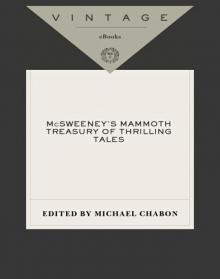 McSweeney's Mammoth Treasury of Thrilling Tales
McSweeney's Mammoth Treasury of Thrilling Tales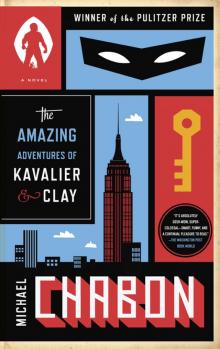 The Amazing Adventures of Kavalier & Clay
The Amazing Adventures of Kavalier & Clay The Yiddish Policemen's Union
The Yiddish Policemen's Union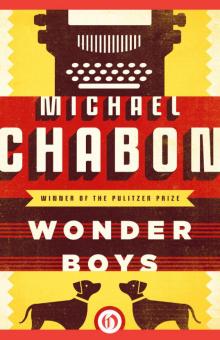 Wonder Boys
Wonder Boys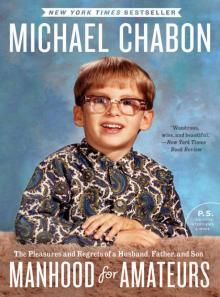 Manhood for Amateurs
Manhood for Amateurs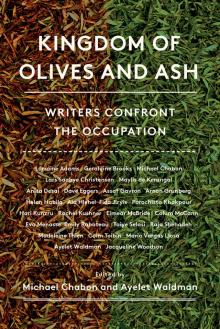 Kingdom of Olives and Ash: Writers Confront the Occupation
Kingdom of Olives and Ash: Writers Confront the Occupation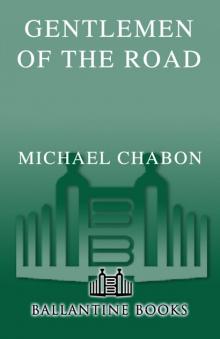 Gentlemen of the Road: A Tale of Adventure
Gentlemen of the Road: A Tale of Adventure A Model World and Other Stories
A Model World and Other Stories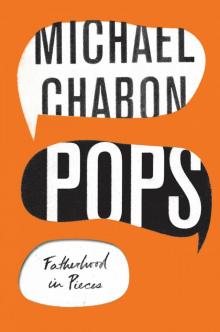 Pops: Fatherhood in Pieces
Pops: Fatherhood in Pieces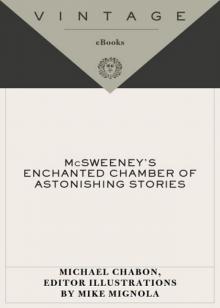 McSweeney's Enchanted Chamber of Astonishing Stories
McSweeney's Enchanted Chamber of Astonishing Stories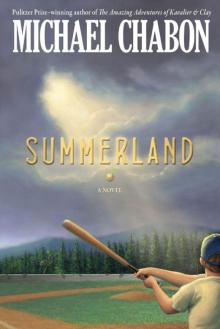 Summerland
Summerland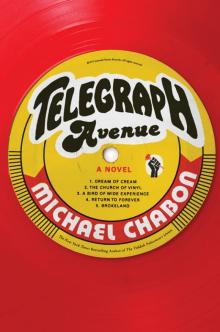 Telegraph Avenue
Telegraph Avenue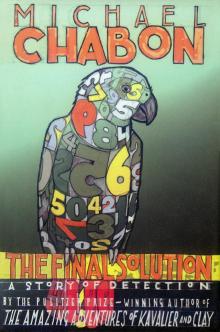 The Final Solution
The Final Solution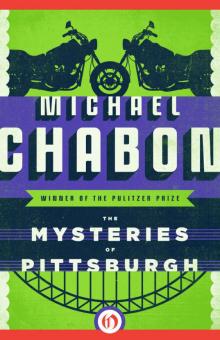 The Mysteries of Pittsburgh
The Mysteries of Pittsburgh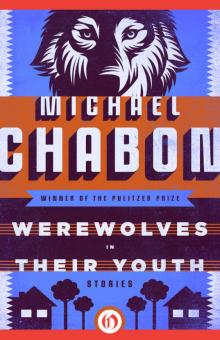 Werewolves in Their Youth
Werewolves in Their Youth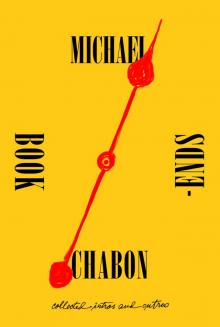 Bookends
Bookends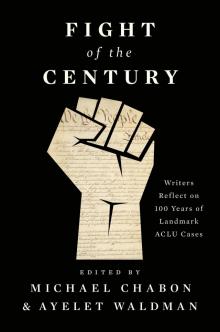 Fight of the Century
Fight of the Century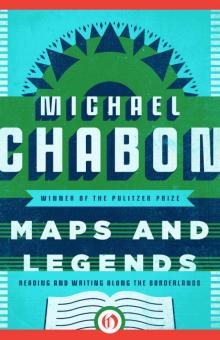 Maps and Legends
Maps and Legends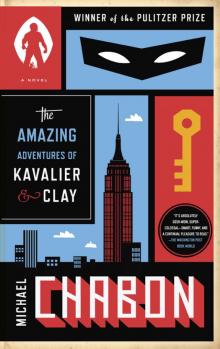 The Amazing Adventures of Kavalier & Clay (with bonus content)
The Amazing Adventures of Kavalier & Clay (with bonus content)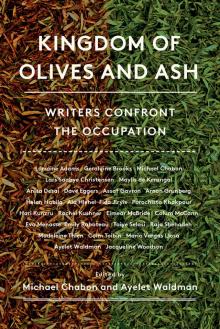 Kingdom of Olives and Ash
Kingdom of Olives and Ash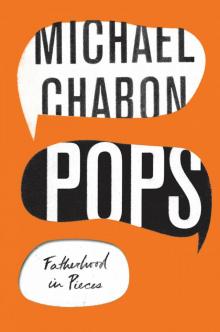 Pops
Pops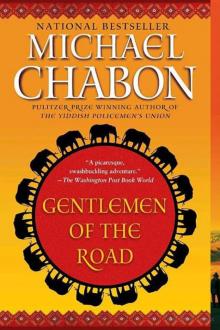 Gentlemen of the Road
Gentlemen of the Road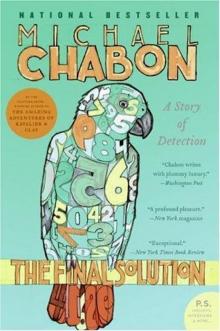 The Final Solution: A Story of Detection
The Final Solution: A Story of Detection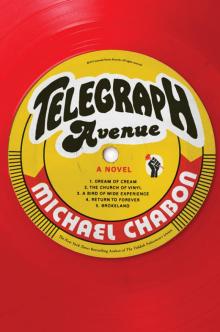 Telegraph Avenue: A Novel
Telegraph Avenue: A Novel